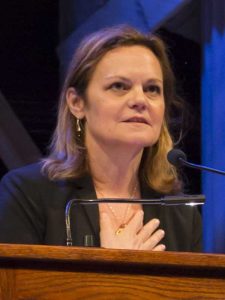Earlier this year, I represented the U.S. Center of the International Theatre Institute at an executive council meeting in Fujairah, one of the seven United Arab Emirates. Our gathering was set on the Gulf of Oman, against the backdrop of Fujairah International Arts Festival (FIAF). Organized by ITI president Mohammed Saif Al Afkham, FIAF includes a monodrama (solo theatre) festival in the small town of Dibba, plus a larger music and theatre series in Fujairah City. Theatres in both locales are surrounded by a pop-up “Heritage Village,” including a marketplace with traditional crafts, foods, costumes, and performances.

The traditional intermingled comfortably with the contemporary. One night, a costumed Mickey Mouse wandered the crowd with balloons, delighting the children in attendance. Nearby, a massive mosque amplified an evening call to prayer. Meanwhile, cleverly themed food trucks offered coffee, ice cream, falafel, and burgers.
Being at the festival for the second time, I was reminded that the arts are part of an integrated sense of identity in this relatively new country. As Al Afkham wrote in the festival program: “United Arab Emirates has become a hotspot on the national and international scene, and is a considerable stage for intellectuals from across the globe. It is a sustainable cultural destination.” Of particular relevance stateside: The Emirates house an NYU campus in Abu Dhabi.
The ITI-EC meeting and festival also occurred amid the evolving COVID-19 crisis, which until that month had its epicenter in the Hubei Province of China. Since ITI’s worldwide offices are currently based in Shanghai, the crisis was especially top of mind for us. Several of our colleagues from China remained at home. Following protocols, a few members of the Shanghai-based ITI team self-quarantined in Paris, where ITI maintains an office, to ensure their health before attending. ITI-worldwide offered all centers the option to change their travel plans. Through a letter and an inspiring series of video testimonials, executive council members sent messages of solidarity to the government and theatre colleagues in China, acknowledging the difficulties they were facing as the first country to experience and aggressively fight the novel coronavirus.
As we attended meetings, we shared concerns about COVID-19’s impact on our families and communities, as well as our art form—one that brings people together in close proximity to one another. For some theatre communities, touring is at the foundation of the ecosystem and requires frequent travel across borders. In some, artists are freelancers with no institutional financial security when performances are canceled and offices closed. We have much to learn from each other and share as our arts communities grapple with this horrible and deadly virus.
ITI-worldwide was co-founded by Rosamond Gilder, an American journalist, in 1947. Originally ITI was meant to facilitate communications among artists in the West and the East during the Cold War. The late Martha Coigney, who became the director of ITI-U.S. in 1967 and president of ITI-worldwide in 1985 (succeeding the Nobel Prize-winning playwright Wole Soyinka), used to speak passionately about the role of artists in bringing the world together. She often quoted a Russian actor, who, while sitting in the halls of the United Nations, said, “The politicians are not the diplomats. We are the diplomats; artists are the diplomats.”
Currently, ITI’s executive council includes representatives from centers in Slovenia, Italy, India, Vietnam, Cuba, Spain, Switzerland, Germany, Russia, Burkina Faso, China, Fujairah, Sudan, and the U.S. In addition to planning world congresses and other projects, much of ITI’s work is centered in topical committees, among them the International Festivals Forum, International Playwrights Forum, an Action Committee for Artists’ Rights, a Network for Heritage, Indigenous Rights, and Migration.
Historically, the U.S. has had strong ties to this committee work. Derek Goldman, co-founder of Georgetown University’s Laboratory for Global Performance and Politics (the Lab) and a co-president of ITI-U.S. with me, is a founding director of UNESCO’s UNITWIN Global Network of Higher Education in the Performing Arts. The Network is very present within ITI and its world congresses, bringing together hundreds of students and faculty for performances and relationship-building. The Cultural Identity and Development Committee had strong leadership from the late Ellen Stewart, founder of La MaMa, and Ali Mahdi Nouri of Sudan; Jorge Ortoll of Ma-Yi Theater Company continued that representation when Ellen was no longer able to. TCG’s own Emilya Cachapero and Kevin Bitterman have also given time, expertise, and leadership to various committees and councils of ITI. And ITI-U.S. is now shared between TCG and the Lab at Georgetown.
As we grapple with the challenges of this highly interconnected, often polarized world, now challenged further by a global pandemic, it gives me great hope to know how expansive, resourceful, powerful, and united our global theatre community is. We can learn from and support each other, whether in times of good health or in times of great crisis. We are the diplomats.
Postscript: As our April issue went to press, the COVID-19 crisis had grown, leading many governments to declare states of emergency and mandate shutdowns of events including theatre. It’s a quickly evolving situation that will be reported online and in future issues of the magazine.

